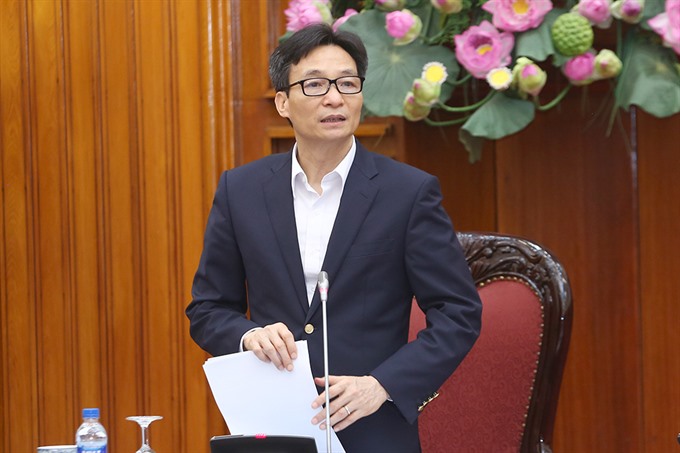 Economy
Economy

Tasks detailed in Resolution 19/2018 must be assigned to each ministry, sector and locality and ensure that follow-up inspections are conducted, said Deputy Prime Minister Vũ Đức Đam.
 |
| Deputy Prime Minister Vũ Đức Đam speaks a meeting of the National Council for Sustainable Development and Competitiveness Improvement yesterday. — Photo VGP |
HÀ NỘI — Tasks detailed in Resolution 19/2018 must be assigned to each ministry, sector and locality and ensure that follow-up inspections are conducted, said Deputy Prime Minister Vũ Đức Đam.
Presiding a meeting of the National Council for Sustainable Development and Competitiveness Improvement yesterday, Đam - the council’s chair – called for the uneven implementation of Resolution 19 among central ministries and sectors to end.
The meeting in Hà Nội centred on three key issues: the draft Resolution 19 on the improved business environment and enhanced national competitiveness in 2018, the implementation of the sustainable development content under the UN 2030 agenda and a labour productivity index.
"Ministries and sectors should co-ordinate more synchronously between the implementation of Resolution 19 and administrative reform, and e-Government development, putting forward concrete contents to solve difficulties facing enterprises,” said the Deputy PM.
He also called for more inspections of and public announcements of ministries, sectors and localities that have and haven’t done well.
According to the World Economic Forum’s global competitiveness report, in 2017, the national competitiveness rose to 55/137 economies from 60/138 economies in 2016; the business environment jumped from 68 to 82 among 190 economies, and innovation increased 12 rankings to stand 47 among 127 economies.
Besides improvements in the business environment, competitiveness remains unsustainable and targets unreachable as the ranking of many indices, including the starting-a-business index, settlement of enterprise bankruptcy, asset ownership register and use, among others is still lower than some countries in the region, Vietnam News Agency reported.
Director of the Central Institute for Economic Management Nguyễn Đình Cung said Resolution 19 aimed to cut between one-third and half of the business conditions, but only five ministries and sectors implemented and detailed plan to reduce business conditions.
They are the ministries of Industry and Trade, Agriculture and Rural Development, Construction and Information and Communications, and the State Bank of Việt Nam.
“Ministries and sectors are still confused in differentiating business conditions designed for certain areas from conditions required for the special management of products, goods,” said Cung.
“Therefore, quite a few conditions on special management on products and goods are regulated into business conditions.”
Regarding the inspection of specialised goods, despite certain changes in management and examination, reforms remain slow. The percentage of imported shipments subject to specialised inspections in the customs clearance period is still 30-35 per cent whilst the Resolution 19 aimed to reduce that to 15 per cent by 2017.
Minister of Planning and Investment Nguyễn Chí Dũng said understanding of how to improve the business environment and competitiveness should be raised.
“It is impossible to consider the lifting of unreasonable business conditions set by ministries and sectors themselves as reform; previous barriers are removed but new ones should not be added. Without proper awareness, the implementation will be slow and ineffective,” said Dũng.
In 2018, the National Council for Sustainable Development and Competitiveness Improvement will accelerate consultancy to the Government and Prime Minister Nguyễn Xuân Phúc in directing and managing the implementation of the National Action Plan for the UN 2030 Agenda, especially in the promulgation of documents on criteria and a roadmap to implement Việt Nam’s sustainable development goals.
Deputy PM noted that Ministry of Planning and Investment should gather opinions to complete a report on Việt Nam’s labour productivity, to promote public understanding of the matter, and determine tasks to raise the country’s labour productivity. — VNS




